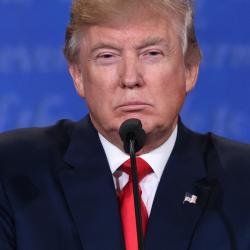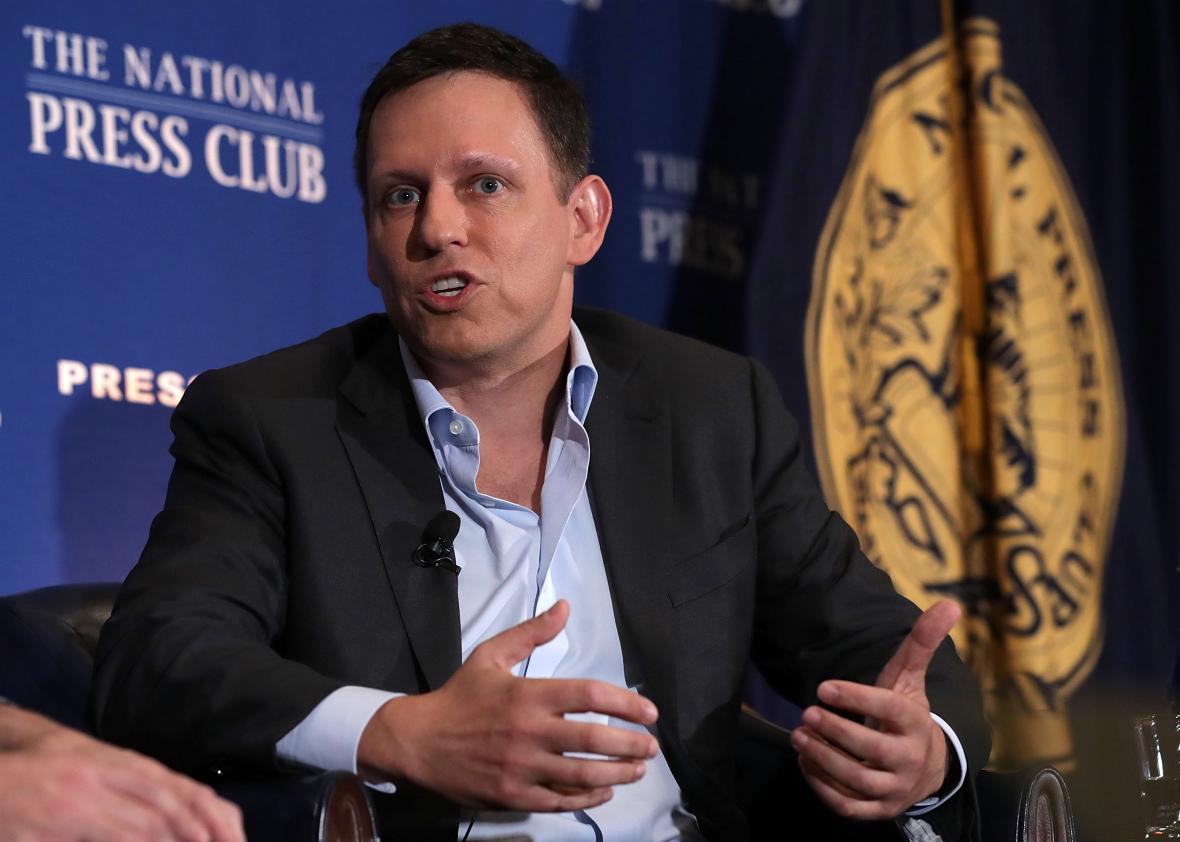Why does tech billionaire Peter Thiel support Donald Trump? It’s a question that has lingered despite multiple attempts from Thiel himself to answer it, including in a televised speech at the Republican National Convention and an exclusive interview with the New York Times.
It’s not simply that liberals can’t fathom what a successful, gay, apparently highly intelligent entrepreneur from Silicon Valley could hold in common with a race-baiting, misogynist, faux-populist real estate developer and reality TV star. It’s also that Thiel himself, while murmuring vaguely positive noises about Trump and shrugging off his most obvious flaws, has failed to present a convincing case for his own conviction. That has left people to devise some rather creative hypotheses as to his ulterior motives. Surely a man with a reputation for playing the long game has something interesting up his sleeve, right?
On Monday, Thiel took another stab at it, appearing at the National Press Club in Washington, D.C., to address his Trump support and take questions from political reporters. This time, surely, we’d get to the bottom of it. But no: He served up the same stew of platitudes (“We’re voting for Trump because we judge the leadership of this country to have failed”), tangents (“College tuition is increasing faster than the rate of inflation”), and dubious claims (“Voters are tired of being lied to”; “Trump voters are tired of war”) that he has ladled out at each previous opportunity.
It’s still possible that Thiel harbors some hidden reasons for supporting Trump that are more compelling than those he has laid out. Perhaps he’s laying the groundwork for his own political aspirations, angling to take on the Trumpist mantle once the Donald is out of the picture. Maybe he just resents the liberal elite more than he cares about the damage Trump could do as president.

Saul Loeb/AFP/Getty Images
But if Thiel does have a hidden agenda, it’s clear by now that he’s not about to reveal it. And Occam’s razor suggests another possibility: Thiel is telling the truth about his reasons for supporting Trump. And, like the reasons of so many other Trump supporters, they’re rooted less in any policy specifics than in a broad yet vague sense of American decline.
In his speech on Monday, Thiel parroted (without credit) the thesis of an Atlantic article suggesting that the media take Trump “literally, but not seriously,” whereas his supporters take him “seriously, but not literally.” That this was the strongest line of his speech lends credence to the notion that he simply isn’t the mastermind he’s reputed to be, at least when it comes to politics. Shortly after insisting that Trump should be given a pass for his ugliest comments, Thiel himself was railing earnestly against something a Gawker blogger once said in jest, using it as justification for his successful campaign to sue the media company out of business. Either Thiel believes Gawker bloggers should be held to a higher standard than the president of the United States, or he hasn’t really thought this stuff through.
Much of the political portion of his speech consisted of complaints about systems that he views as “bubbles.” These ranged from widely agreed-upon bubbles such as the 1990s dot-com bubble and the student-loan system to more dubious bubbles such as the “war bubble,” “trade bubble,” and “globalization bubble.” One gets the feeling that “bubble” is a catchall term for things Thiel doesn’t like. (If he’s in the market, though, I’ve got another bubble he might want to add to his list.)
He also lamented rising health-care costs, the stagnation of middle-class incomes, and the damaging effects of free trade on certain sectors of the U.S. economy. These are the sort of issues that everyone agrees are problems, with the salient question being how best to solve them. But for Thiel, their very existence is proof that our political ruling class has failed, and will continue to fail, and that we need to elect an outsider—no matter how goofy, insubstantial, or changeable that outsider’s own proposals might be.
This is, at least, a coherent position, if a somewhat naive one. Thiel bolstered it by suggesting he would have preferred Sanders to Clinton as the Democratic nominee. Yet other parts of his argument seemed patently contradictory, such as his repeated implication that a vote for Trump equates to a vote against war. (Trump himself has called himself “the most militaristic person there is.”) Thiel also contended that “Trump’s agenda is about making America a normal country,” yet he spoke reverently of John F. Kennedy, who was perhaps the ultimate American exceptionalist, not to mention a globalist and a free-trader. He railed against the nation’s political elites for being out of touch, then complained that a “single-digit millionaire” such as Hulk Hogan can’t get a fair shake in the legal system.
This is not to suggest that Thiel’s speech was a disaster, or that he lacks any talent for politics. He adeptly side-stepped some awkward questions about Trump’s actual views, and retreated into familiar generalities when pressed on specifics. (Asked what “key factors” in Trump’s economic plan he thought would nurture small business, Thiel rambled about bubbles for a while before concluding that he just feels Trump “viscerally understands” that regulations are bad for business formation.) He also displayed a flash of unexpected intellectual humility, such as when he admitted he doesn’t know how to address the media’s business problems. Thiel even sprinkled in a moment of self-deprecation, when he called Amazon CEO and Washington Post owner Jeff Bezos “the toughest person in the world to compete with at this point” by way of explaining, jokingly, that he has “no plans to buy the Washington Times.”
As an undergrad at Stanford, Thiel founded a conservative student newspaper and majored in philosophy; as a law student, he applied for a Supreme Court clerkship. No one should be surprised if it turns out he harbors political ambitions, either as a candidate or a kingmaker. They may just be rather more mundane than previously imagined by the conspiracy theorists who fret about Theil’s interest in floating cities for the rich and vampiric youth elixirs.
“What Trump represents isn’t crazy, and it’s not going away,” Thiel said Monday. That may be true, and if so, Thiel will have done well to position himself as a voice for the movement once the election is over. But Thiel’s support for Trump was frankly more interesting when it seemed like there might be something crazy behind it. At this point, he’s just another pundit with some tired talking points and a mediocre political mind.
